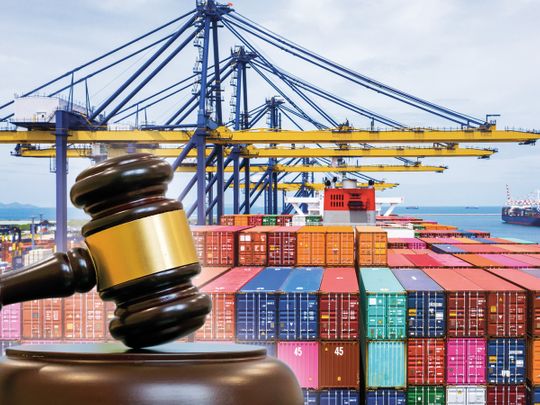
In conversation with Richard Briggs, Executive Partner at Hadef & Partners and Vice Chairman at EMAC
Covid-19 has impacted all industries and every aspect of our lives. What is the extent of impact of the pandemic on international arbitration?
International arbitration can proceed through the pandemic and much of international arbitration is now online. While it is not always preferred to have witnesses heard online, there is already a culture of videoconferencing in arbitration, where witnesses can be heard if a normal hearing is not possible. This mechanism can easily be used during the times of the pandemic. All arbitration centres, including Emirates Maritime Arbitration Centre (EMAC), are enabling their procedures so that online filing of pleadings and documents is easier.

International arbitration can proceed through the pandemic and much of international arbitration is now online.
EMAC is the only specialist maritime, offshore energy, and logistics arbitration centre in the region. What essentially makes EMAC truly unique?
Yes, EMAC is the Middle East’s only centre for maritime, offshore and logistics arbitration. It contributes to the services cluster already available in Dubai and the UAE. It also complements the arbitration and legal facilities already available in Dubai as the region’s business centre. In terms of its members, arbitrators and mediators, EMAC has chosen quality persons with substantive international and regional experience in the maritime business.
Arbitration has served as a common mechanism for the settlement of disputes for decades. How could EMAC help companies settle disputes in a cost-effective manner?
All arbitration needs to be cost-efficient. This is particularly the case as once parties have signed an arbitration clause, the parties are committed to arbitration under such clause, and they often cannot use the courts. If that arbitration mechanism is too expensive, it prohibits the parties from contesting smaller claims, or sometimes even in collecting debts.
EMAC’s Rules are specifically designed to ensure that its arbitration is not just well-suited to larger and more complex claims, but can be used efficiently for smaller to medium-sized claims. The main mechanism for this is the Expedited Arbitration Rules (fast-track procedure) set out in Article 50 of the EMAC Rules. In essence, this means that expedited rules apply to all claims with a value of under $1.9 million (Dh6.9 million) and a fast-track procedure should be finished within three months. A sole arbitrator is also required if the claim is less than $270,000. By forcing parties into fast-track procedure, the EMAC Rules limit the monies that can be spent both on the arbitration itself, and indirectly, on the fees of the lawyers appointed by the parties.
What are the various options available to parties and their lawyers in the current situation?
There are two simple options available now — either file the arbitration online and follow the online procedures, or wait until arbitration centres are fully back to normal. Such options may not always be available if there are time bar issues, where a claim needs to be filed within a time frame. In any event, much of the filing of an arbitration now needs to be done online anyway, so the advice of lawyers for their clients should be to simply get on with it.













